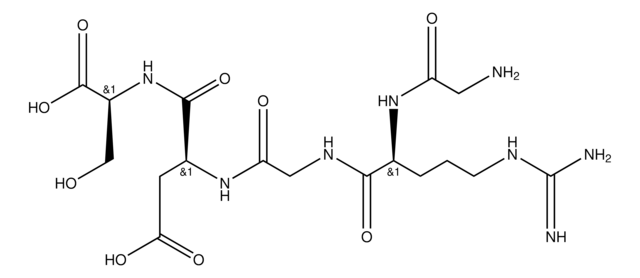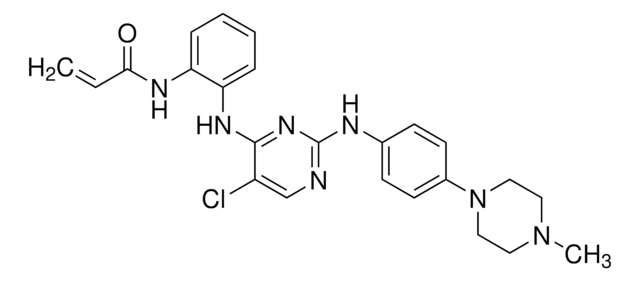SRP0401
Histone H4 peptide (Di-methylated R3), biotin
≥90% (HPLC)
Sign Into View Organizational & Contract Pricing
All Photos(1)
About This Item
UNSPSC Code:
12352202
NACRES:
NA.32
Recommended Products
Assay
≥90% (HPLC)
form
aqueous solution
packaging
pkg of 500 μL
concentration
200 μM
shipped in
dry ice
storage temp.
−70°C
General description
Histones have an important role in the organization and modification of chromatin. The nucleosome is the basic unit of the chromatin. It is made up of two molecules each of histones H2A, H2B, H3 and H4 wrapped with approximately 146bp of DNA. Histone H1 binds to the nucleosomes at the DNA entry and exit points and stabilizes them. The gene encoding this protein is localized on human chromosome 6p22.2.
Application
Study enzyme kinetics, and screen small molecular inhibitors of PRMT for drug discovery and HTS applications.
Other Notes
500 μL at 200 μM, or 100 nmol Sold as 500 μL
Storage Class Code
10 - Combustible liquids
WGK
WGK 2
Flash Point(F)
Not applicable
Flash Point(C)
Not applicable
Choose from one of the most recent versions:
Certificates of Analysis (COA)
Lot/Batch Number
Don't see the Right Version?
If you require a particular version, you can look up a specific certificate by the Lot or Batch number.
Already Own This Product?
Find documentation for the products that you have recently purchased in the Document Library.
A Comprehensive View of the Epigenetic Landscape Part I: DNA Methylation, Passive and Active DNA Demethylation Pathways and Histone Variants
Anna Sadakierska-Chudy
Neurotoxicity Research, 27, 84-97 (2015)
Core histones H2B and H4 are mobilized during infection with herpes simplex virus 1.
Conn KL, et al.
Journal of Virology, 85(24), 13234-13252 (2011)
The histone variant H3.3 marks active chromatin by replication-independent nucleosome assembly.
Ahmad K and Henikoff S
Molecular Cell, 9(6), 1191-1200 (2002)
Our team of scientists has experience in all areas of research including Life Science, Material Science, Chemical Synthesis, Chromatography, Analytical and many others.
Contact Technical Service








